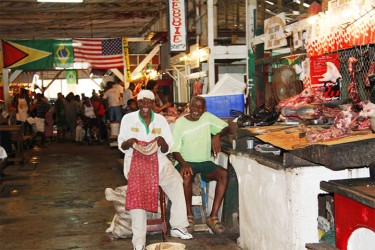It was Sunday and the hapless Brazilian football team had long made its inglorious exit from the 2014 Football World Cup. But remnants of the country’s colours still hung limply from some of the stalls along the Butchers’ Aisle in Bourda Market. The show of support for the five-time winner of the biggest prize in international football had to do with much more than good neighbourliness. As Stabroek Business learnt, Brazilian miners may well be the single largest market for the butchers in Bourda Market. So that even if the sentiments of some of the butchers might lie elsewhere, no one was risking offending the Brazilians.
On Sunday the butchers were still commiserating with the Brazilians, but there was more on their minds. Falling gold prices had witnessed a sharp dip in meat purchases by the Brazilians.
Not that the butchers were unduly melancholy. They are a hardy breed, accustomed to the changes in a sector that has its peaks and its troughs.
Some of the 36 stalls comprising Butchers’ Aisle are family businesses, handed down one or two generations.

Fitz Browne currently runs the stall established by his mother Margaret during the 1950s. He recalled that there is a history to the relationship between the butchery and mining sectors. There was a time, he said, when the Guyana Geology and Mines Commission was one of his best customers. He recalled too that Omai Gold Mines Ltd used to purchase “thousands of pounds of meat” for its workers. Browne said that at the peak of demand he sold up to five cows every day. These days, on “a good day,” he sells two. Browne’s two uncles were also butchers.
Then there is Arthur Williams who is part of the family that owned Williams Meat Company on Saffon Street. Another uncle, Joe Williams, used to run a meat stall in Stabroek Market. The stall which Williams currently occupies in Bourda Market was established by his mother. On Sunday the energy and theatre that attends Butchers’ Aisle was missing.
On busy shopping days the approximately hundred metre corridor becomes a kind of gauntlet which mostly women run to an assortment of expressions of endearment from butchers and their touts boisterously marketing their meat. These days, most of the stalls are manned by young, energetic men though a few women hold their own on the aisle.
Andrea Hack is conspicuous in her while coat standing close to her stall; the first one on the left as you enter the market from the eastern extreme of the aisle.
The pursuits of a butcher go way beyond selling meat. They must attend to the far more demanding task of purchasing, in which case they must engage the farmers at the Municipal Abattoir. There are those butchers, too, who travel to the ranches to select their cows.
Talk about the impact of gold prices on the demand for meat persists. Hack appears to buy into the theory about a nexus between the demand for meat and falling gold prices. Robin, another butcher, who has been in the market for about twelve years is in no doubt about the nature of the problem. He estimates that the Brazilians account for more than half of the market and that the patronage of domestic consumers simply cannot fill the gap created by the reduced demand for meat among the miners.
The prices of meats have not fallen away in recent months, but the butchers have not been able to eke out a price increase either. What they hope is a temporary drop in demand has resulted in a glut on the market. On Sunday beef was being sold at $400; pork at $460; chicken at $360 per pound; liver at $400 per pound; salted beef at $500 per pound and cow face at $200 per pound. Of late even larger quantities of meat have appeared on the market on account of the greater volumes that have been arriving in the city from farms in Essequibo.
The butchers in the Bourda Market accept that the industry is one of fluctuating fortunes. When the rains come again and the animals are marooned in the Berbice savannahs prices could rise again, marginally. The butchers on the aisle have other grouses too, but those, they say, are common to the traders in the municipal markets. One suspects that if they had a wish to make it would be that they begin to see the faces of their Brazilian customers again.




